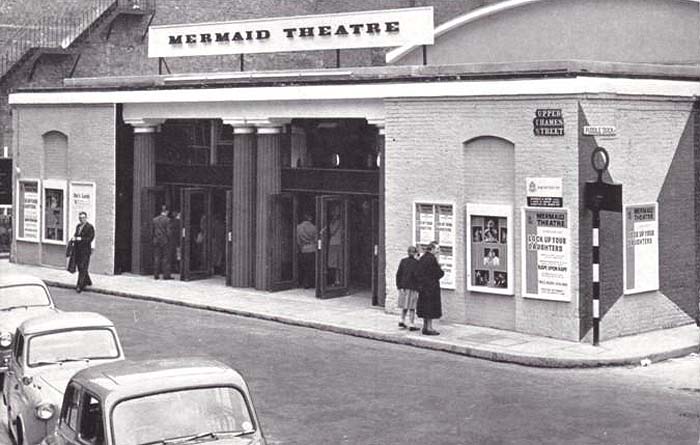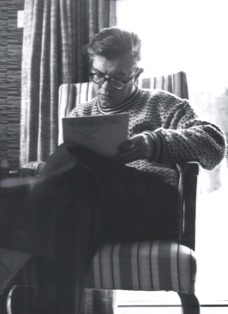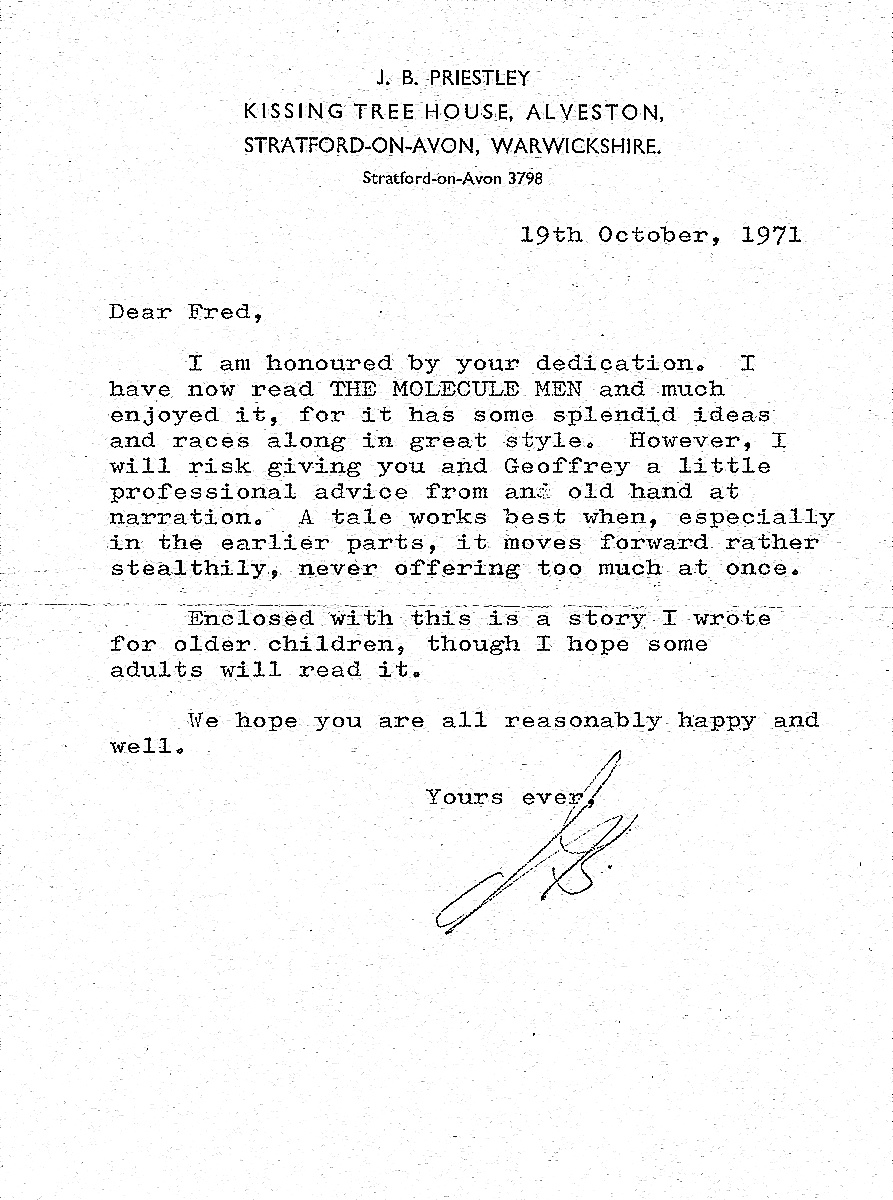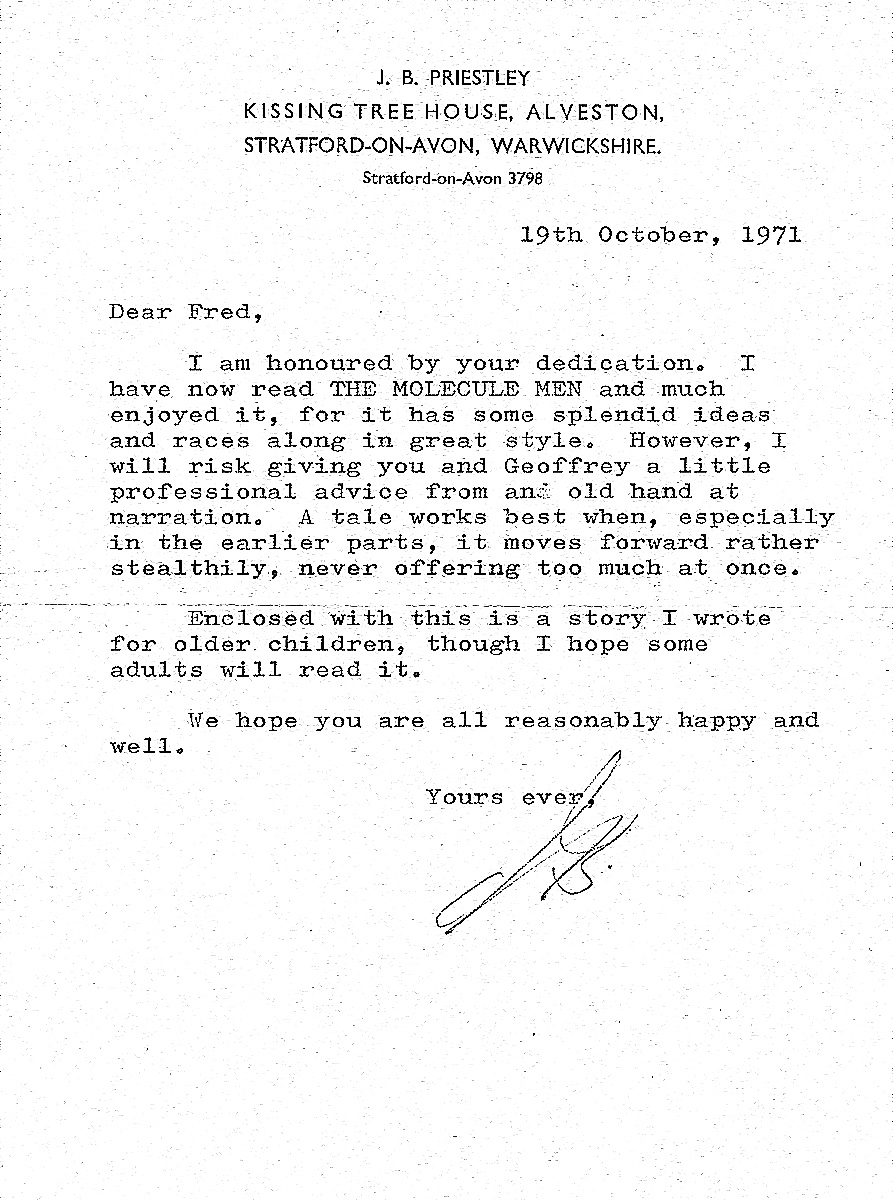Fred Hoyle An observer of the world and a ponderer on its problems ...
Author
While stationed at Nutbourne during the war, his colleague Cyril Domb recollected that Hoyle would relax by reading science fiction. When chided for wasting his time on such literature, Hoyle replied:
"I have a purpose in mind. These people don't know any real science and they make money by writing this stuff. I, who know some science, should be able to do much better".
With his down to earth approach and strong Northern accent, he first popularised science in the series of broadcasts for the BBC’s Third Programme in 1950, entitled ‘The Nature of the Universe’, and voted most popular broadcaster for that year.
At home, he supported his wife, Barbara’s, love of drama, appearing as Bottom in her local village production of A Midsummer’s Night’s Dream.
Among their close friends were Bernard and Josephine Miles of the Mermaid Theatre, where in 1962 the play “Rockets in Ursa Major’ was staged.
Hoyle supported the Miles in their venture “The Molecule Club’, where productions on topics such as Electricity, educated children about science.
Collaborating with John Elliot of the BBC, they wrote the popular 1960s television science fiction series ‘A for Andromeda’ and its sequel ‘Andromeda Breakthrough’.
Hoyle’s output, not only of technical works, but also of popular non fiction and science fiction was prolific.

Extract from the "Rockets in Ursa Major" programme.
Brinkmanship - a word to the very young by Fred Hoyle
From the centre of their known world the young men of Greece sailed on voyages of adventure and discovery. No news reached their homeland until - often years later - they returned full of fascinating tales of the strange lands and wonderful sights they had seen. The mystery and magic of this newly penetrated world clung to their wind-scoured sunburnt faces challenging the wandering minstrels to sing well of their courage and daring and awakening the imagination of the poets to write great stories. Time blended memory and myth into romantic history.
New worlds were discovered when Elizabeth the First was queen and the poets sang again.
Then came progress! The machine age with its worship of speed. No sooner the motor car with its alarming (for those days) speed, than man took to the air and Jules Verne winged away in his thoughts on a journey to the moon. The biplane gave way to the jet; sound radio and television brought news instantly into our homes; recently came a first count down; and we were on the threshold of new adventures.
And if we go beyond the 'wine-dark' seas of the Greek islands, beyond the New World of the Elizabethans, beyond our neighbourly moon - out from our familiar secure planet Earth into space, what will we see?
Surely we'll cast one backward glance at the beautiful Earth with its shining white clouds partly concealing the dark seas and red deserts, green land and flashing icefields, before we go on to new worlds.
Would there be living creatures anywhere? Certainly; for why should our planet be unique? The right conditions may arise only rarely but they will arise often enough for many many planets to support some form of life.
Is it best to go looking for them in Space? Well, maybe not actually in ships. Perhaps we should start with radio waves transmitting our own powerful signals and keeping big electrical ears open for signals from outside.
So much has yet to be done on this brink of new discoveries. Which of you will be sailors, I wonder, and who will write the songs and stories?
A for Andromeda was one of the BBC's first major sci-fi TV productions of the 1960s, and was devised by prominent astronomer Fred Hoyle, who contributed the outline for the story, with the final scripts being written by BBC producer John Elliot.
The seven-part serial involved the reception of radio signals from the constellation of Andromeda which, when decoded, prove to be the instructions for a highly advanced computer. After following the instructions, further signals are received which, when programmed into the computer, result in the creation of a new lifeform, Andromeda, who takes on the appearance of lab assistant Christine who had earlier been killed in an accident with the alien-designed equipment.
The role of Andromeda was played by a young Julie Christie, while other major characters include computer scientist Dr John Fleming (Peter Halliday), biologist Professor Madeleine Dawnay (Mary Morris), and Intel agent Kaufmann (John Hollis). The series transformed Julie Christie from an unknown drama student into a star.
The Italian television network RAI subsequently produced their own adaptation of A for Andromeda in 1972, with the five-part serial being produced in black and white and on videotape just like the UK original. To this day it remains one of the few original UK sci-fi TV productions to be re-made in this manner. The Italian production has been released in its country of origin on both DVD and video, but sadly without English subtitles.
A further production of A for Andromeda occurred in 2006 when BBC Four commissioned a ninety-minute re-make as a follow-up to their 2005 update of The Quatermass Experiment. By a bizarre coincidence, a 16mm print of the sixth episode from the 1961 original was returned to the BBC archives just a few days after the new version was announced.
The majority of A for Andromeda remains missing from the BBC archives but, despite this, 2 Entertain still managed to assemble The Andromeda Anthology in 2006, which collected together all of the existing footage from A for Andromeda and the complete Andromeda Breakthrough. A complete off-air audio recording of The Last Mystery was subsequently returned to the BBC late in 2006.
PRIVACY POLICY
Hoyle Productions Ltd is committed to protecting and respecting your privacy
This policy sets out the basis on which any personal information we collect about you, or that you provide to us, on this website will be used.
USE OF PERSONAL INFORMATION
We use information about you in the following ways: To respond to your comments and queries and to ensure that content from the Site is presented to you in the most effective manner.
COOKIES
“Cookies” (also known as HTTP cookies, web cookies or browser cookies) are simply small pieces of data, which are stored as text files on your computer, whenever you visit our website. Their purpose is to help our site remember particular actions you may have done there in the past. For example, cookies may track, when you have logged into the site, visited certain pages or clicked certain buttons. This improves your user experience. In many cases, cookies are even essential for certain features of a site. We may also use Google Analytics© to track your usage of the site. If you do not wish to have Google Analytics© place cookies on your browser you can download a Google Analytics Opt-out Browser Add-on at https://tools.google.com/dlpage/gaoptout
_utma Lasts 2 years from set/update It is used to distinguish users and sessions. The cookie is created when the javascript library executes and no existing __utma cookies exists. The cookie is updated every time data is sent to Google Analytics.
_utmb Lasts 30 mins from set/update It is used to determine new sessions/visits. The cookie is created when the javascript library executes and no existing __utmb cookies exists. The cookie is updated every time data is sent to Google Analytics.
_utmc Lasts until the end of the browser session Not used in ga.js. Set for interoperability with urchin.js. Historically, this cookie operated in conjunction with the _utmb cookie to determine whether the user was in a new session/visit
_utmz Lasts for 6 months from set/update It stores the traffic source or campaign that explains how the user reached your site. The cookie is created when the javascript library executes and is updated every time data is sent to Google Analytics.
_utmv Lasts for 2 years from set/update Used to store visitor-level custom variable data. This cookie is created when a developer uses the _setCustomVar method with a visitor level custom variable. This cookie was also used for the deprecated _setVar method. The cookie is updated every time data is sent to Google Analytics.
ARE COOKIES HARMFUL?
Cookies cannot harm you or your computer. They cannot contain viruses, cannot install harmful software and cannot damage your computer in any way. We do not use cookies to store any sensitive information, such as name, address or contact details.
Despite this, if you do wish to disable or remove cookies, please see the “Help” section of your browser or mobile device. Each browser or device handles the management of cookies differently, so you will need to refer to your appropriate “Help” documentation. However, as mentioned, please be aware that cookies are essential for certain features of websites to work properly.
For more information about cookies, please visit http://www.allaboutcookies.org.uk or refer to the documentation provided with your web browser software.
WHY ARE WE TELLING YOU THIS?
The information provided here on the use of cookies demonstrates our compliance with recent cookie legislation. We also want you to fully understand your privacy, how cookies affect you and to be entirely comfortable with your visit to this website.
We hope that this information eases any concerns you may have had about your privacy and safety with cookies. BY CONTINUING TO USE OUR WEBSITE, YOU AGREE TO BE SUBJECT TO THE TERMS OF THIS COOKIES POLICY AND OUR USE OF COOKIES AS DISCLOSED IN THIS POLICY.
INTERNET SECURITY
We take the security of personal data seriously.
We use uk2net( www.uk2.net ) for our web hosting. Their servers are housed in a secure environment with high levels of physical security.
To help safeguard your privacy, there are a number of things you can do to protect yourself from Internet fraud. Choose a password you can remember but others cannot guess. Changing it regularly, and if you do write it down, keep it somewhere safe and secure.
You might also consider logging off when you finish a session on a secure Site. Clear your browser's ‘caches’ manually or have it done automatically by your browser when you log off. Try not to leave a trail of activities on your computer that others might use to steal your identity.
THIRD PARTY WEBSITES
Third party Internet sites that you can link to through our website are not covered by this policy and Hoyle Productions Ltd accepts no responsibility or liability for the security of these websites.
GENERAL
Hoyle Productions Ltd is contactable via post at Hoyle Productions Ltd, 42a, Wimpole Road, Great Eversden, Cambridge, CB23 1HR, UK or by email at info@hoyle.org.uk.
We keep our privacy policy under regular review and we will place any future updates on this webpage. This policy was last updated on September 2015.
COPYRIGHT OWNERSHIP
The copyright in this website and the material on this website, including without limitation the text, artwork, photographs, images, music, audio material, video material and audio-visual material on this website, is owned by Hoyle Productions Ltd and its licensors.
COPYRIGHT LICENSE
Hoyle Productions Ltd grants you a worldwide non-exclusive royalty-free revocable license to view this website and the material it contains on a computer or mobile device via a web browser. You may also copy and store this website and the material it contains in web browser's cache memory and print pages from this website for your own personal and non-commercial use.
Hoyle Productions Ltd does not grant you any other rights in relation to this website or the material on this website. This means you must not adapt, edit, change, transform, publish, republish, distribute, redistribute, broadcast, rebroadcast or show or play in public this website or the material on this website nor automate or systematically collect data from this website without Hoyle Productions Ltd prior written permission.
By downloading material from this site you agree to abide by our terms and conditions regarding copyright.
PERMISSIONS
You may request permission to use the copyright materials on this website by emailing us at info@hoyle.org.uk or by writing to Hoyle Productions Ltd, 42a, Wimpole Road, Great Eversden, Cambridge, CB23 1HR, UK.
This policy was last updated on September 2015.
© 2005 - 2021 Hoyle Productions Ltd


